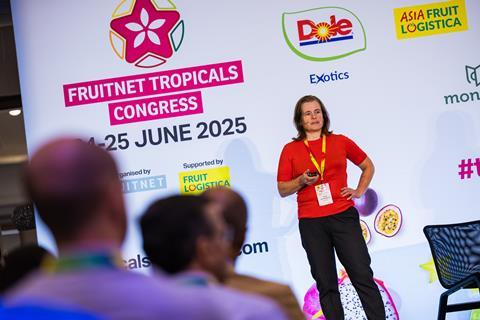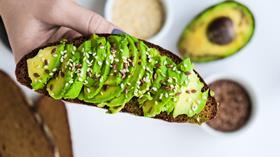Leading analyst offers cautiously optimistic assessment of tropical fruit sector, highlighting untapped market potential for avocados and mangoes despite supply chain disruptions and consumer hesitancy

Despite widespread geopolitical and economic turmoil, the broader economic outlook for tropical fresh fruit remains extremely positive, according to one of the sector’s leading business analysts.
Speaking at the Fruitnet Tropicals Congress in Antwerp on 24 June, Cindy van Rijswick, global strategist for fruit, vegetables and floriculture at RaboResearch Food & Agribusiness, offered a cautiously positive assessment of the economic climate.
“We have a lot of economists in our group looking at the general economic environment and making forecasts. Considering all that’s happening around us, they are still quite optimistic. The economic forecast doesn’t look as bad as some people would expect,” van Rijswick said.
Van Rijswick did warn that a sharp rise in economic and policy uncertainty was set to weigh heavily on agri-food businesses, at least in the short term.
Much of this uncertainty stems from tariff tensions, which are already stalling global investment activity.
“We also keep track of indicators of economic and policy uncertainty, and it’s really gone up lately. The uncertainty that tariffs are causing is probably one of the main negative effects. We work with food and agri companies around the world, and a lot of these are keeping investments on hold now. If the tariffs go up, and also trigger other tariffs in other countries, then the impact could be quite severe.”
Logistical resilience remains another major concern for the global fruit trade. While container freight rates appear to be stabilising, on-time arrivals are still far below pre-pandemic levels, creating ongoing unpredictability in the supply chain, she observed.
“Global shipping remains a challenge, given all the conflicts around the world. The expectations around reefer freight rates aren’t too bad, but it will really depend on what happens in the next few months and years going forward. We think that the rates will stabilise, but looking at the on-time arrivals of ships, it’s still quite bad. If we compare to the pre-Covid period, it’s still below that with only 50 per cent arriving on time. We still don’t see that going back to the 80 per cent we saw in 2019.”
High input costs are also squeezing grower profitability around the world, Van Rijswick suggested, pointing to instances where rising costs have outpaced income growth in recent years.
“In general, cost levels for producers are high, and we expect them to remain high. Take avocado farmers’ margins in Mexico, for example. Between 2020 and 2024, their cost per hectare has gone up quite substantially, but at the same time the income has not gone up that much. That means their margins are under more pressure. This will remain a challenge.”

‘Sticker shock’
Although disposable incomes in Europe have increased recently, consumer caution is apparently keeping spending low, especially in the fresh produce category.
Van Rijswick attributed this behaviour to an inflation-based disconnect between income growth and price perception.
“In Europe, disposable incomes have gone up quite fast in the last year and a half year,” she said. “The only issue is that consumers often don’t realise they do have money in the pockets, and they do have a job. When they enter the supermarket, they are still not used to the new price levels. We call it ‘sticker shock’.” This has translated into high saving rates, with consumers in nearly all European countries starting to save more and more money, she noted. “Yes, there is money to spend, but consumers are so uncertain that they just save, instead of spending it on fruits and vegetables.”
Despite the economic challenges, tropical fruits like avocados and mangoes continue to perform well, with significant untapped market potential, especially in Northern Europe.
“Looking at the tropical fruits, avocados are still doing very well with high growth, especially last two years. In Germany, mango [sales] have been a bit more volatile, and that has to do with supply issues. But overall, tropical fruits are doing pretty well.
”In terms of market penetration, which is the share of households buying each type of fruit once a year at least, for avocado and mango it’s still below, or around 40 per cent in both the Netherlands and in Germany.
”That’s pretty low compared with other fruits. So in theory, there is still a lot of potential for growth. She added: “I don’t expect avocados or mangoes to be reach the same level as bananas, but I believe it should be possible to increase [their penetration] above 50 per cent. And that’s a lot of fruit.”
Avocados, in particular, have emerged as a fruit powerhouse globally. And yet with just a fifth of the world’s population accounting for most commercial sales, Van Rijswick said she saw considerable room for further expansion.
“Looking at just avocados, we calculated the total market value or estimated it, and it’s already over US$20bn. And that’s only the commercial value, so people buying it in some kind of a retail channel. That’s huge, and it’s only a small share of global population – just about 20 per cent – that accounts for nearly 90 per cent of this commercial value. “So if the other 80 per cent of the global population would also try to buy a few avocados, the market could still absorb the increasing volumes.”












